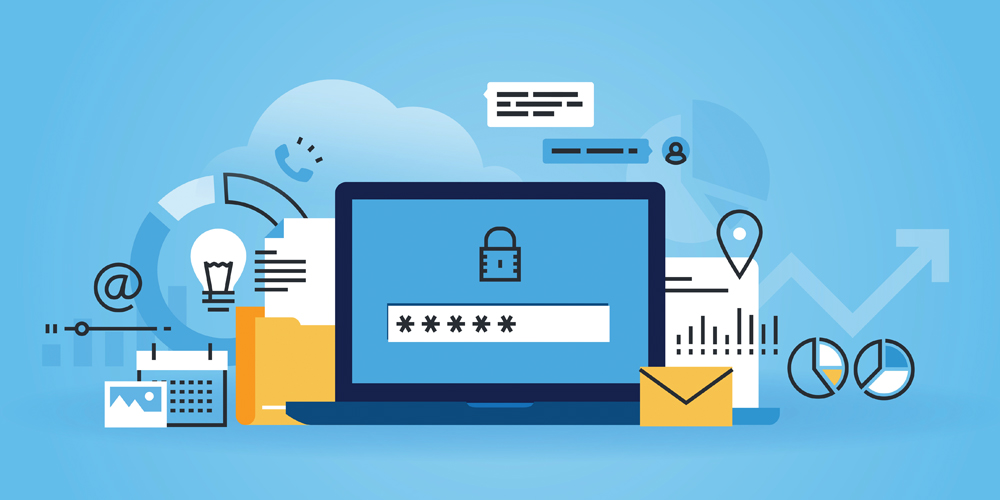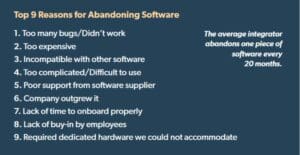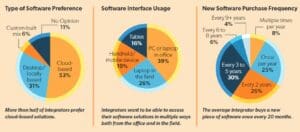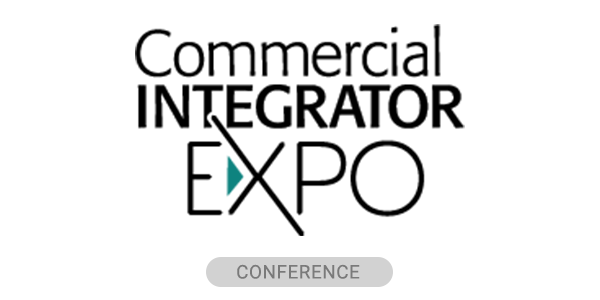Paul Ostrin of Unlimited Integration in Houston explains his frustration with industry software like this:
“When I call my HVAC contractor for a service call, the person who answers the phone can immediately look up my system in his computer while on the call. In their system, it tells him instantly what type of equipment I have installed and when it was installed. He verifies my address and makes an appointment for the service call for next Thursday, for example. When I hang up the phone, I immediately get a text message confirming the appointment for next Thursday. And then the day before the appointment, I get a text message confirming, ‘Are we still good for Thursday?’
“On the day of the appointment, I receive a text message informing me that the technician is on his way indicating the time window on which he will arrive, with his name and picture of him. Then, an hour to 30 minutes before the appointment I get a text message that shows his current location, saying, ‘He’s on his way.’ The technician comes to my house and does his thing. While there, he takes my credit card and swipes it into a remote payment system. After he leaves, I get a text with a link to a customer satisfaction survey asking, ‘How did we do?’ and a link to leave a Google review.
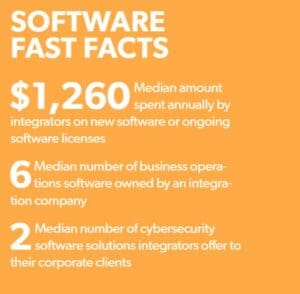 “And this HVAC contractor is a small company with two trucks. It’s embarrassing that my HVAC guy has a better software system than the AV guy — and the entire thing runs on an app. It’s just ridiculous that the custom installation industry does not have software that can do something like this. I am paying something like $12,000 per year for software licenses and I can’t even get it to work properly on a mobile app. There is a vacuum of simplicity in the industry; it’s super frustrating,” he says.
“And this HVAC contractor is a small company with two trucks. It’s embarrassing that my HVAC guy has a better software system than the AV guy — and the entire thing runs on an app. It’s just ridiculous that the custom installation industry does not have software that can do something like this. I am paying something like $12,000 per year for software licenses and I can’t even get it to work properly on a mobile app. There is a vacuum of simplicity in the industry; it’s super frustrating,” he says.
Ostrin’s experience is not unique. Integrators across the spectrum shared their frustrations and needs for industry software as part of the 2021 Commercial Integrator Software Deep Dive Study. Integrators revealed they spend a median of $1,260 per year in either new software or ongoing fees, and they buy on average four new pieces of software every five years. In total, the typical commercial AV company uses six pieces of software to operate his or her business. Integrators also note that, on average, they have completely abandoned three pieces of software for various reasons.
Download the full Deep Dive 2021 Software Report
So why go through all the headaches of purchasing and learning software if it’s such a hassle?
The bottom line. Dealers report that utilizing software to help run their company adds a median of 13.4% to their bottom line. For the typical custom installation company that earned approximately $1.36 million in revenue last year at a 30% profit margin, that means software alone adds nearly $55,000 directly to the bottom line.
For some integrators, the benefits of implementing software are even more apparent. In total, 4% of integration companies report seeing a 50% boost to their bottom line by adopting various types of software. Meanwhile, some dealers must see other benefits in software than improvement in profits; about 6% report that using software does not boost their bottom line at all.
Faster installations, improved documentation and the ability to close more sales are the primary reasons dealers give for the results achieved using software.
Digging into the Data
According to the study, 97.6% of all integration companies use at least one type of software to run their business. (That means 2.4% of integrators are still really old-school operators utilizing 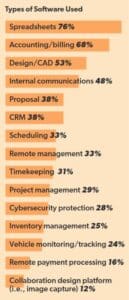 nothing but paper and pencil for everything from estimates to invoices.) The most common is spreadsheet software like Microsoft Excel, which is used by 76% of integration firms. Accounting/billing software (68%), Design/CAD software (53%) and internal communications software like Slack, Teams or Zoom (48%) are the next most-used types of software.
nothing but paper and pencil for everything from estimates to invoices.) The most common is spreadsheet software like Microsoft Excel, which is used by 76% of integration firms. Accounting/billing software (68%), Design/CAD software (53%) and internal communications software like Slack, Teams or Zoom (48%) are the next most-used types of software.
As noted, integrators stop using certain pieces of software after a while. The primary reasons for that cessation are simply because the software has too many bugs or just doesn’t work, the cost or incompatibility with other pieces of software. Sometimes however, it’s not that easy to simply stop using a certain piece software.
But despite the fact that dealers report dropping software from time to time, they are not willy-nilly about it. According to the study, dealers purchase new software once every 20 months, so that certainly shows dealers are committed to a software solution once they purchase it. One out every three dealers (25%) report they buy a piece of software or multiple pieces of software at least once per year.
Related: What Use is Big Data? Analytics Data is the Answer
One integrator expressed extreme frustration with the ongoing access fees he continues to pay for a piece of software that he abandoned years ago, but he still needs to be able to access the data in that old software program for his past clients or projects. Nearly one in 10 integrators (9%) report paying more than $10,000 per year on software.
A decade ago, the idea that a single piece of software could run your business was a pipe dream. Today, it’s reality with multiple turnkey systems available for dealers with modules for proposals, CRM, accounting, inventory management, project management, scheduling and timekeeping/payroll available. In all, 14% of integration companies report they use some type of multifunction software system for running the business, yet 37% of dealers say they would prefer such a solution. That means 23% of dealers want a turnkey solution but have either yet to find it or just haven’t pulled the trigger on adopting it yet.
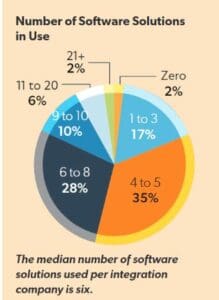
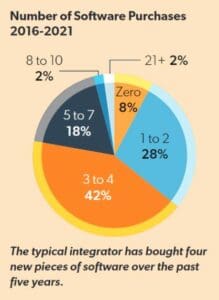 As noted, the median number of software solutions used by an integrator is six. About 2% of integrators employ more than 21 pieces of software. When it comes to selecting software, cost is the No. 1 priority, followed by speed, support and compatibility. Dealers are also concerned with the secureness of the data and mobile device accessibility.
As noted, the median number of software solutions used by an integrator is six. About 2% of integrators employ more than 21 pieces of software. When it comes to selecting software, cost is the No. 1 priority, followed by speed, support and compatibility. Dealers are also concerned with the secureness of the data and mobile device accessibility.
One of the biggest trends in the software world in recent years has been the migration from desktop-based solutions to cloud-based. By having the brains and the data sit in the cloud, dealers have lower upfront adoption fees and instead pay monthly for the software seats. Over half of dealers (52%) say they prefer a cloud-based solution compared to locally based desktop platforms (31% preference). About 11% of dealers have no opinions and 6% of dealers operate their companies using their own custom-built software. Indeed, nearly one in three dealers (31%) reports that they have attempted to create their own software solution at one time or another.
Accessibility to the software is vital. Dealers report that 19% of all their software usage takes place on a mobile phone, 39% occurs in the office, 26% via a laptop in the field, and 16% via a tablet in the field.
Referrals from other integrators is the primary method dealers use to choose the software they buy, followed by Internet investigations, trade shows and trade magazines or websites.
With cybersecurity becoming a growing concern among corporate clients, commercial AV integrators are getting in the business of providing software services to their clients. In all, 72% of commercial integrators offer some type of software for their clients, and 58% of those integrator who do charge an ongoing maintenance or licensing fee to their clients.
Integrators Sound off on What They Want from Software Suppliers
Integration companies are never shy about vocalizing what they want from any of their suppliers, let alone their software provider. Here are just some of the verbatim comments from dealers about their software wants and needs from both the survey and from a Commercial Integrator focus group.
We want a young company that is willing to listen to us and make changes quickly, rather than saying a change is going to happen six months from now. We look for a support center that’s typically somewhat local and will answer the phone and talk to us. We look for somebody who knows our industry well enough to understand the business that we’re doing, and understands how to build change orders.
I prefer everything to be cloud-based. I don’t want the Internet in my office or the Internet at your office to be the reason my software doesn’t work.
We look hard at the security aspect of any cloud-based software. If we’re going to put a bunch of client data up there, I want to know that it’s somewhat secure.
We need links from the software to QuickBooks and to email.
Better tools for tracking feedback on various software tools and functionality.
Software needs to be easier to input via smartphones.
I would like to see an all-inclusive software for the security market with training and go-live support.
Ease of use is most important.
I want the software supplier to sit down with the users and really understand their business. Also, look at all the additional pieces integrators have to use to make their business operate and build that into the product.
Openness for integration with other systems is key. Cloud support for ease of deployment is increasingly important.
Monthly fees are an immediate turndown. Annual payments or version purchase is better.
I want the project management portion of my software to give me the ability to better manage the change orders or track changes of the equipment at the time of the installation, as well as give me real-time project profitability.
Most software seems to be catering to larger business of a 100+ employees. I would like something for the one and the one-to-11 employee range with customer support especially for small businesses.
Ease of setup, use, adoption, and intuitive user interface are most important.
The software needs to have an open API so individual software can talk to each other. It doesn’t need to be an all-in-one solution if everything works together.
Supplier should talk to users BEFORE making the software and BEFORE making big changes. Many companies make software, but they have never used it themselves; there’s a big difference.
Reduced cost and greater security are vital.
The ability to file import/export from one system to another is really important. A new speaker simulation software might be cool, but if I have to redraw the room to use it, I’ll probably use something else.
I want to see accounting and point of sale software solutions added to the great project management solutions available.
The software needs to be backward compatible with earlier versions.
Every project will likely require service at some point. Great project management is critical, but the software must include a great service-ticket tracking system.
Interoperability between other popular solutions is the key. It would be great if all software solutions would adhere to some standardized method of business process, instead of surgically solving very specific problems and ignoring overall business workflow.
We need better integration with other software and it needs to be cloud-based.
We really just want one system that will do it all and if it can’t, then at least integrate with QuickBooks. Researching all the different programs for CIs is frustrating, because they all have one or two things they do well but leave holes that I actually have to get another program to fill the void.
Please make the software more user-friendly.
I want software that has fewer restrictive requirements for using Apple devices.
Must accept signatures from the app for contracts and legal forms.
Customer support is a key item … good software + poor support = Disaster
Needs to be highly configurable so we can tweak it.
Interoperability with the industry standard platforms (like Salesforce).
Very important to support both import and export of data.
Ensure easy upgrades with no bugs.
There are too many variables to have a singular software that does it all; we tried that and it was either much too complex to use or too expensive or both.
Should avoid repetition such as duplicate fields; also, Mac support is a consideration.
More advanced security measures or adaptability to improve security over time as the security landscape changes
More in-person training.
The entire company has to adopt the software and communicate back what is needed by each to make it effective and the software has to be able to support multiple ways of use.
Have it ready when released. It’s better to fix bugs in advance, than try to fix it once it is in the field.
Simple is better. Being able to quickly navigate through your software saves so much time and headache. The fewer clicks down the rabbit hole to get to end points the better.
KISS (Keep It Simple Stupid) — most end users these days get impeded by not understanding how to operate even the simplest of applications unfortunately.
Any new software should have an easy way to integrate into all the other software for the process at hand — with easy ways to get data in and out of it.
An easy 3D design tool would be nice.
Software providers need to beta test more. Developers are always not aware of what’s needed in the field.

